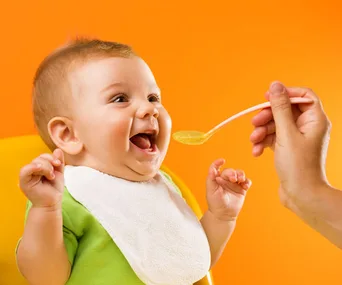Starting solids, health check, independence and baby-proofing your home
Starting solids
Breastmilk remains your baby’s most important source of nutrition during her first six months of life. According to nutritional guidelines from the Australian National Health and Medical Research Council, feeding your baby solids is not recommended until she is six months old.
Make her introduction to solids gradual and include a mix of basic, natural foods, like fruit and vegetables. Start your baby on one type of food, then work up to combining flavours. For convenience, first foods are commonly pureed, but many babies prefer to eat soft chunks of food they can pick up and feed themselves.
For purees, try steaming, boiling or microwaving potato, pumpkin, squash, parsnip, pear or apple, which can then be pureed with a little boiled water or expressed breastmilk.
You can puree small amounts with a spoon and sieve, but for larger quantities you will need a food blender. Freeze excess puree in ice-cube trays.
Food preparation rules:
Wash and remove peel, pips, stalks and husks from fruit or vegetables, then cut into evenly sized pieces so they all cook in the same amount of time.
Allow food to cool before pureeing – it needs to be fairly sloppy in the early days. To thin it, mix in a little breastmilk or use the water in which you cooked the vegetables.
Some commercial rice cereals may cause constipation, so mix them with lots of fruit and veg.
Always test the temperature of baby food before offering it.
Never reheat in a microwave because it heats unevenly.
As your baby’s appetite increases, use a food processor or blender to puree larger quantities.

Take your baby along to a health practitioner for their six-month check up. (Image: Getty Images)
Health check
At six months, take your bub along to your child family health nurse, midwife, doctor or paediatrician for a health check.
Your little one’s weight and growth, hearing, vision and oral health will be assessed and it’s a great to chance to ask any questions you may have regarding their development.
Bub’s six month immunisations are also due now.
Independence
Your baby’s growing independence is clearly demonstrated in what she likes and dislikes. She may also take the initiative more in her relationship with you, starting ‘conversations’ and holding her arms out to you. By now, your baby can entertain herself by looking at new objects or by chatting to herself. You might hear her repeating sound patterns and babbling in a sing-song voice.
Baby-proof your house
If you haven’t baby-proofed your house by now, make sure you do it soon. Cover all electrical outlets, place household cleaners and other hazardous materials in locked cabinets, and put away all choking hazards. Also be very careful about not leaving steaming mugs of coffee or curling irons on bench tops where your baby might pull them down.

